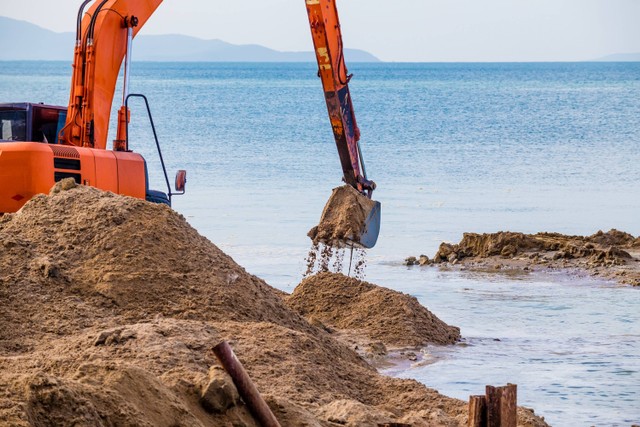IPB Observer Surprised Jokowi Opens Export of Sea Sand: Is it Economically Motivated?

President Jokowi lifted the ban on the export of sea sand through Government Regulation (PP) Number 26 of 2023 concerning Management of Marine Sedimentation Products which was issued on March 15, 2023.
Responding to this, Marine Observer from the Bogor Agricultural Institute (IPB), Zulhamsyah Imran, said that the lifting of the ban on the export of sea sand seemed to side with the capitalist group.
“This needs to be criticized. Actually, are we siding with the people or capitalist groups to satisfy the economic side?” said Zulhamsyah in the Maritime and Fisheries discussion, Sunday (11/6).
Furthermore, Zulhamsyah assessed that the nomenclature used by the government was too ambiguous. This is because the sedimentation referred to in PP 26 of 2023 has two meanings, namely mud and sea sand.
He questioned the government’s motive for making such ambiguous regulations. According to him, it is very difficult to distinguish sea sand and mud.
“Why can’t sea sand be mined openly? Is this motivated by economics?” he said.
On the other hand, Zulhamsyah explained, marine resources, especially fish, in Indonesia are increasing. The amount of fish stocks or maximum sustainable yield (MSY) in Indonesia has shifted from the original 6.5 million tonnes per year to 12.5 million tonnes per year. Then from 571 fisheries management areas (WPPNRI) to 718 regions including Papua and West Papua.
“This is a big question, if our fish resources are large, why don’t we optimize that potential?” he wondered.
“Why should we kill in a slightly harsh language by destroying the ecosystem they live in?” he added.
Previously, the Minister of Maritime Affairs and Fisheries (Menteri KP) Sakti Wahyu Trenggono emphasized that the issuance of Government Regulation Number 26 of 2023 concerning Management of Marine Sedimentation Products would protect coastal ecosystems and small islands from the threat of illegal sea sand extraction activities.
Moreover, said Trenggono, so far there has been no regulation governing it. The PP received a response from the public, one of which was because the opening of sea sand exports was considered to be detrimental to the environment.
“So far there are no rules, which means taking (sea sand) freely from the beach, from the islands. This is what we regulate. How can I know that? When the Directorate General of PSDKP we operate surveillance,” Trenggono said in a written statement, Wednesday (7/6).
“For example on Rupat Island, the sand is almost finished. Then on Bawah Island, there are a lot of them in the Batam area and so on. We will stop and seal them,” he added.
According to him, the use of sea sand for reclamation activities has also become more organized with the issuance of the PP. In the future, the material that may be used to support reclamation activities is the result of sedimentation, not sea sand taken from any location.
Sources: Kumparan Bisnis